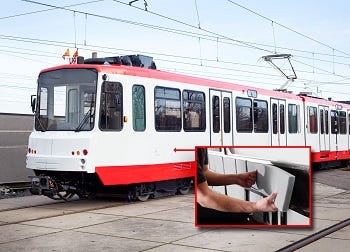The tram system in Bonn, Germany dates back to the 1970s, and although the rolling stock is somewhat long in the tooth, it's structurally sound according to the city's municipal works: hence the decision to upgrade them with the latest technology including sound insulation foam fabricated using a flexible, open-cell foam made from melamine resin.
April 3, 2012
The tram system in Bonn, Germany dates back to the 1970s, and although the rolling stock is somewhat long in the tooth, it's structurally sound according to the city's municipal works: hence the decision to upgrade them with the latest technology including sound insulation foam fabricated using a flexible, open-cell foam made from melamine resin.
The foam supplier BASF (Ludwigshafen) is providing fabricator Hanno Werk GmbH & Co. KG (Hanover, Germany) with blocks that will be converted into panels for supply to the municipal works. Each of the trams will be clad with around 150 square meters of Basotect G grade in a thickness of 3 cm. In the driver's cab, the foam will be laminated with an additional aluminum sheet. The municipal works are able to renovate three vehicles in their workshop each year. The intention is that the first fully modernized tram is to run in the Rhein-Sieg district in 2012. Eventually, 25 old trams will be modernized.
"The prices of new [trams] have risen rapidly in recent years," explains project manager Alexander Wingen from Bonn's municipal works. "But our old trams are still structurally sound. This is why we have decided to convert them and equip them with the very latest technology."
|
Insulation foam retrofitting solves noise, vibration, thermal issues in classic trams. |
The municipal works chose Basotect for soundproofing thanks to its fine, open-cell structure, which is very good at absorbing reverberations caused by multiple reflection of sound on surfaces. This lowers the level of noise within the vehicle, and vibrations are also reduced meaning that passengers can travel in a quieter and more comfortable environment. As a result of its low thermal conductivity, the material also guarantees good thermal insulation. Moreover, the lightweight foam, which weighs just nine kilograms per cubic meter, helps to reduce the overall weight of the vehicle.
"Another advantage of Basotect for us was that it is very easy to process without producing any dust," says Wingen. "This was important to us because we have created a special workshop in which we will gut the trams and completely modernize them. This means that we can cut the material to the exact size required on site using our own cutting tools."-[email protected]
About the Author(s)
You May Also Like



